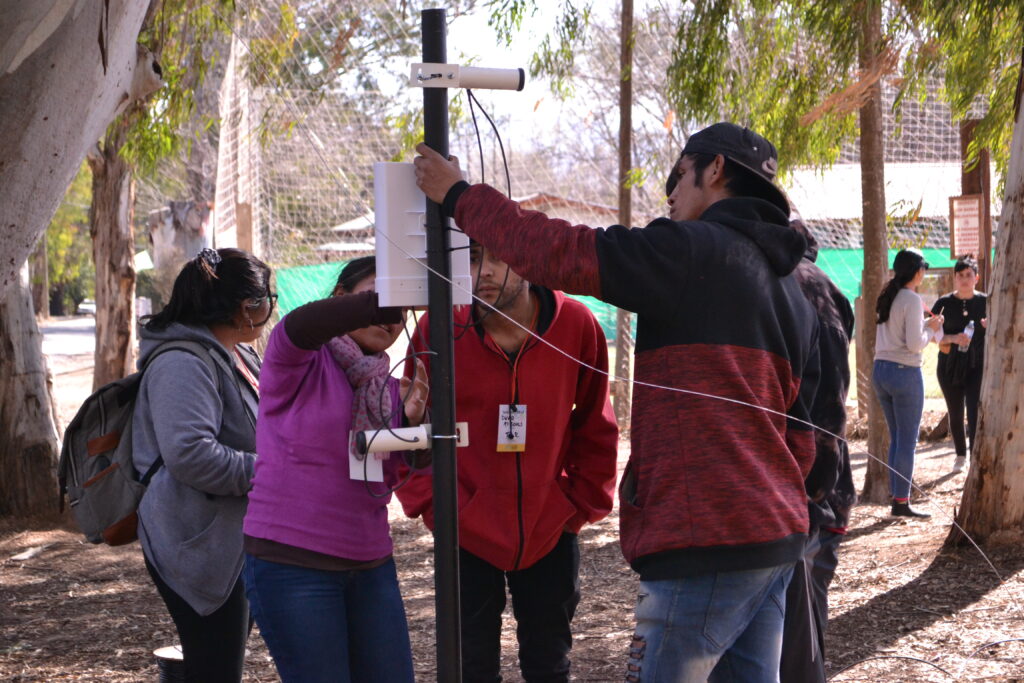Building a community of community networks in Argentina
In Argentina, Altermundi is working to bring awareness about the importance of connectivity to all parts of the country.


Building connectivity infrastructures is usually easier said than done, especially when you mix in government regulations and a large, rural landscape. But this doesn’t hold back Altermundi, an Argentina-based NGO, from working on their mission to bring affordable connectivity to all parts of Argentina, from the barrios to rural villages. Next to installing and teaching community members about telecommunications networks, they also work to raise awareness about the importance of connectivity and how communities can advocate for themselves and apply for government funding for connectivity. As our partner, the project they are currently working on brings all of what they find important together. To explain exactly how they are doing this, we asked them some questions about the newest community networks they are building, the LibreRouters they use, and how communities in Argentina can get more assistance for telecommunications.
Can you explain the different parts of your project?
In particular, The Seedbed project brings the AlterMundi training team together with 16 communities from around the country to facilitate the following main objectives:
● Accompanying the communities to understand, form, and organize their own community network project.
● Deployment of their initial network, with infrastructure provided by the project including 4 complete LibreRouter nodes, with materials and basic tools for its assembly.
● Assembly and presentation of the project for the Roberto Arias Program, which is governmental assistance for telecommunications.
Thanks to the joint funding of APC and 48percent.org and the coordination between AlterMundi and Nodo TAU, this project also includes:
● The training “seedbed in Community Networks” for applicants to the Roberto Arias Program.
● 2 open and public conversations for dissemination of information on Community Networks, state policies and the Roberto Arias program.
● 2 collective workshops for revision, correction, and consultation for the preparation of the Roberto Arias applications.
● Creation of guides and tutorials with the objective of facilitating the learning of concepts, tools, and procedures useful when applying to the Roberto Arias Program.
● The writing of 12 reports by Nodo TAU accompanying the seedbed process and the context in which this project takes place.
● The writing of material on Community Networks, technological sovereignty, gender and human rights.
● The writing of material on Community Networks as an agent of telecommunications, State policies and FFSU.
Where will the new community networks be located?
From the province of Córdoba: Bialet Masé; Perla; Valle Alegre; Sebastián Elcano; Villa Ciudad Parque; and the capital of Córdoba, Campo de la Rivera
From the province of Salta: Guachipas; Santa Victoria Este; and Angastaco
From the province of Jujuy: Palma Sola and El Bananal
From the province of Neuquén: Plottier
From San Luis, Merlo.
From Santa Fe, Tostado.
From Santiago del Estero, Ojo de Agua.
From Tucumán, Santa Ana.

Can you explain what LibreRouters are and how they work?
The LibreRouter is a router designed by AlterMundi from its experience in facilitating and installing community networks and their relationship with other networks These experiences allowed us to gather technical and usability needs and create something we thought would satisfy those. Its main objective is to facilitate autonomy and technological sovereignty in the deployment, management, and maintenance of community networks in territories which are relegated from digital life.
The thing is that community networks are not a profitable market segment for the industry. This means that the equipment used is not adequate to meet their particular needs. Therefore, for the LibreRouter project we give great importance to the development of hardware and understandable software, but also to the documentation that guides the use and application in the network. This is important work focused on the communities themselves having the capabilities to deploy their own autonomous communication infrastructures and exercise their right to the collective creation of the Internet.
More technically, the LibreRouter is a weatherproof 3-radio wireless router. It has LibreRouterOS installed, an operating system for wireless mesh networks friendly to people without deep technical knowledge.
Using its two 5 GHz radios and sector antennas, the LibreRouter automatically forms a mesh network with other LibreRouters within range. Using a built-in 2.4 GHz radio, it creates an access point for devices to connect to the network. In addition, if any LibreRouter on the local network connects to the Internet or any other network, all of those devices will have communication with that other network.
What is the Roberto Arias program and why is it important to tell people in Argentina about it? What are you doing to make sure people get this information?
Roberto Arias is an ENACOM program whose objective is to finance the development of Community Internet Networks, supported by the Universal Service Trust Fund (FFSU), through Non-Refundable Contributions (ANR). The FFSU is fed by the contribution of 1% of the total income of telecommunications service providers in Argentina. The main objective of the program is to universalize Internet connectivity throughout Argentina, particularly by supporting community-managed Internet networks. It is the first fund in the world created by a country or government exclusively for community networks.
In order to publicize and facilitate the application process for communities and organizations, we carried out, among other actions:
● Open discussions, such as the one held in the city of Rosario, virtual discussions and discussion forums.
● Training material and guides to facilitate the understanding and completion of procedures and the different ways in which ENACOM requires information on a project to be provided.
● Providing support to organizations that spontaneously approach us requesting our guidance and/or collaboration.
● Organizing the “Semillero de Redes Comunitarias para Postulantes al Programa Roberto Arias” (Community Networks Seedbed for Applicants to the Roberto Arias Program), a project that encompasses all these activities, including the financing of the baptism deployment of 16 new community networks in Argentina.
● Generating awareness, articulation, and training in community organizations and networks, as well as in the Argentine State and other States through participation in international events.
Can you tell us about your work to demonstrate that connectivity is a human right?
AlterMundi has presented at various national and international events with the aim of being a main component in the talks that seek to influence public policies and position the access of connectivity as a fundamental right as opposed to the hegemonic message of the internet as a commodity. We create collective power through talks, alliances, and teamwork with other organizations with international and national influence; for example, we co-founded the DC3, the CLRC, the CARC, where the political vision regarding connectivity and community networks in particular is based on grassroots participation and the guarantee of rights and solutions to digitizable needs of communities.
We also write material for these spaces, for events, and media that address the issue. In this particular project, we worked together with Nodo TAU to write about experiences and information on the deployment and progress of Argentine communities in the framework of this project, as well as two studies, one focused on gender and the other on advocacy and public policies.
One of the main objectives of our organization is to deepen our work to influence public policies that guarantee and finance the right to connectivity, communication, and other rights today which are strongly digitalized, mainly in territories where the commercial model and state projects copied from the big cities are not valid alternatives. Today the protagonist in the environment is the Roberto Arias Program that we hope will last. In the future it will be this and other programs and policies that enable and accompany community internet network projects that guarantee the right to connectivity.